
Boosting Business Efficiency: The Role of AI in Custom Software Development
Discover how AI-driven solutions are enhancing custom software development and driving business efficiency.
Artificial Intelligence is reshaping the custom software development landscape, enabling businesses to improve their operations, increase automation, and deliver innovative solutions faster.
AI in Custom Software Development: A New Era
Artificial Intelligence is a powerful tool for businesses looking to enhance their software development processes. It improves efficiency, speeds up development cycles, and allows for highly tailored solutions.
AI can automate routine and time-consuming tasks, such as code generation, bug fixing, and testing, allowing developers to focus on more complex challenges.
Personalized Software Solutions
AI enables businesses to create highly customized solutions based on specific business requirements, offering unique features and functionalities tailored to the needs of the user.
Smarter Decision Making
With AI, businesses can analyze vast amounts of data, allowing them to make data-driven decisions when it comes to the software development process and the final product.
Improved Software Testing
AI-driven testing tools can identify bugs and performance issues more effectively than traditional methods, leading to higher-quality software and faster delivery times.
Enhanced User Experience (UX)
AI enhances user interfaces and experiences, making software more intuitive and adaptive, while predicting user needs and providing tailored interactions.
How AI is Transforming Custom Software Development Across Industries
AI is making waves in custom software development, with businesses across various sectors adopting it to improve efficiency and deliver better solutions.
AI is enhancing fraud detection, automating financial processes, and providing personalized services, making banking apps smarter and more secure.
E-commerce
AI is revolutionizing e-commerce platforms by personalizing recommendations, streamlining inventory management, and optimizing customer service via chatbots.
Healthcare
In healthcare, AI-powered software helps in patient management, predictive diagnostics, and data analysis, creating highly efficient solutions for healthcare providers.
Retail
AI helps in developing custom software for inventory management, demand forecasting, and customer experience optimization, resulting in improved business efficiency.
Manufacturing
AI is used to develop custom software solutions for predictive maintenance, supply chain optimization, and real-time monitoring, driving operational efficiency in manufacturing.
Emerging Trends in AI for Custom Software Development
The use of AI in custom software development is rapidly evolving, and several trends are shaping its future.
Low-code and no-code platforms, powered by AI, enable businesses to create custom software solutions without the need for extensive coding knowledge, democratizing software development.
AI-Driven Code Generation
AI tools are capable of generating code automatically, accelerating the development process and reducing human error, thus improving productivity.
Intelligent Chatbots and Virtual Assistants
AI-powered chatbots and virtual assistants are becoming an integral part of custom software solutions, offering users a personalized and interactive experience.
Automated Quality Assurance (QA)
AI-driven QA tools are automating the process of identifying bugs, improving the accuracy and speed of software testing, leading to more reliable and bug-free software.
How AI is Improving Business Efficiency in Software Development
AI offers numerous practical advantages for businesses looking to optimize their custom software development processes and overall operations.
With AI automating repetitive tasks like coding, testing, and bug fixing, businesses can drastically reduce the time it takes to develop and launch software.
Cost Savings
AI reduces the need for extensive human intervention in coding, testing, and debugging, thus lowering labor costs and minimizing the risk of costly errors.
Scalability and Flexibility
AI-driven solutions are highly scalable, enabling businesses to adapt their software as their needs evolve without starting from scratch.
Improved Software Quality
AI-powered testing and quality assurance tools ensure that the software is of the highest quality, reducing the risk of defects and improving user satisfaction.
Enhanced Collaboration and Productivity
AI helps teams collaborate more effectively by automating routine tasks and providing valuable insights, enabling developers to focus on strategic tasks that drive innovation.
Key Challenges in Implementing AI in Custom Software Development
While AI can significantly improve efficiency, businesses must address several challenges when integrating AI into custom software development.
AI relies on high-quality data to function effectively. Gathering, cleaning, and maintaining data can be a complex and time-consuming process.
High Initial Investment
Implementing AI solutions can require a substantial upfront investment in technology, training, and infrastructure, which may be challenging for smaller businesses.
Integration with Legacy Systems
Integrating AI-powered software with existing legacy systems can be complex, requiring businesses to balance new technologies with older infrastructure.
Security and Privacy Concerns
AI-driven software requires access to sensitive business data. Ensuring the security and privacy of this data is crucial to avoid data breaches and maintain user trust.
Skill Gaps in AI
To fully leverage AI, businesses may need to upskill their development teams or hire AI specialists, which could be a challenge in a competitive talent market.
Best Practices for AI Integration in Custom Software Development
To maximize the potential of AI in software development, businesses should follow these best practices and implementation tips.
Invest in processes to collect, clean, and organize data, as high-quality data is essential for AI to produce accurate results.
Start Small and Scale Up
Begin with small, manageable AI projects and scale as you gain more experience, ensuring that the integration is smooth and cost-effective.
Use AI to Augment, Not Replace
Use AI to augment human decision-making rather than replace it entirely. AI should be viewed as a tool to improve processes and provide insights.
Collaborate Across Teams
AI development should involve cross-functional teams, including developers, data scientists, and business stakeholders, to ensure the solution meets all requirements.
Ensure Robust Security Measures
Implement strong security protocols to protect sensitive data and ensure compliance with regulations, such as GDPR and CCPA.
Provide Continuous Training
Invest in training for your team to keep up with the latest AI developments, ensuring they can effectively utilize AI tools and methodologies.
Monitor and Optimize AI Models
Regularly evaluate and refine AI models to improve their performance and accuracy as new data becomes available.
Key Terms to Know
The simulation of human intelligence processes by machines, especially computer systems, to perform tasks that typically require human intervention.
Machine Learning (ML)
A subset of AI that enables computers to learn from data and improve their performance without being explicitly programmed.
Deep Learning
A type of machine learning that uses neural networks with many layers to analyze data and recognize patterns.
Natural Language Processing (NLP)
An area of AI that focuses on enabling machines to understand, interpret, and generate human language.
Automation
The use of technology to perform tasks with minimal human intervention, enhancing efficiency and reducing errors.
Data Mining
The process of discovering patterns and relationships in large datasets to make data-driven decisions.
Neural Networks
A system of algorithms designed to recognize patterns by interpreting sensory data through a process that mimics how a human brain works.
Chatbots
AI-powered programs designed to simulate conversation with users, providing quick and automated responses.
Robotic Process Automation (RPA)
The use of AI to automate repetitive tasks, improving business efficiency and reducing the need for manual intervention.
Predictive Analytics
The use of data, statistical algorithms, and machine learning techniques to identify the likelihood of future outcomes based on historical data.
What’s Next for AI in Custom Software Development?
The future of AI in custom software development holds even more potential for growth and innovation.
AI will be increasingly integrated into DevOps processes, helping teams automate tasks such as deployment, monitoring, and incident response.
More Advanced AI-Driven Personalization
AI will continue to improve the personalization of software, creating unique user experiences based on individual preferences and behavior.
Enhanced Collaboration with No-Code Tools
No-code platforms powered by AI will democratize software development, allowing business users to create and modify software without extensive coding knowledge.
Integration with Blockchain
AI will work alongside blockchain technology to enhance software security, improve data integrity, and automate smart contracts.
Continued Improvement in Automation
Expect AI to further enhance automation in the software development lifecycle, improving speed, efficiency, and reducing human error.
AI: Transforming Custom Software Development for Business Efficiency
AI is revolutionizing custom software development, offering businesses smarter, faster, and more efficient solutions. By leveraging AI, companies can optimize their development processes, reduce costs, and create software that meets their unique needs, ultimately driving business efficiency and innovation in a rapidly changing


